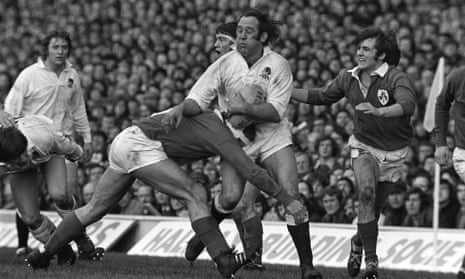English victories against the All Blacks in New Zealand are rare events and the win in Auckland on 15 September 1973 turned the world of rugby union upside down. To say the England team of the 1970s were underachievers is putting it politely, and few gave John Pullin’s side much of a chance against a team, led by Ian Kirkpatrick, who were finely tuned at the end of their winter season. England, though, played to their strengths. They had a strong scrum with the front row of the hooker Pullin and his two prop forwards Fran Cotton and the Cornishman Brian “Stack” Stevens at its heart, and it was Stevens who was to play a major role that day.
Stevens, a farmer, who has died aged 76, gave a good impression of a runaway bullock in the second half at Eden Park when, on a windy day, he pounced on a loose clearance from the debutant All Black Bob Lendrum, exchanged passes with the lock Chris Ralston and scored a try that turned the game. When, five minutes from time, Lendrum, whose afternoon was turning into a nightmare, failed to collect a high kick, England scored a third try through their flanker Tony Neary and the visitors secured a memorable 16-10 victory.
Stevens was a hardened campaigner by that time. Two years earlier he had been part of the only Lions squad to have triumphed in New Zealand but it was a sign of the times that in 1974 he announced that he could not make history with Willie John McBride’s Lions tourists to South Africa because he had to stay at home on the family farm in Cornwall. He would be busy haymaking while the Springboks were being beaten, explained Stevens. Rugby in those far-off amateur days was not going to pay any bills.
For Stevens, being an England international was not a life of glamour. When his father did let him leave the farm for England training sessions, and for a brief time to switch allegiance from his beloved Penzance and Newlyn club for a spell with Harlequins, Stevens was often forced to hitch a lift to London and back home on a lorry carrying vegetables to Covent Garden.
Stevens, who won 25 England caps between 1969 and 1975, was the youngest of six children of Cecil Stevens, a miller who went into farming, and his wife, Beatrice. He was educated at Leedstown high school and Cornwall Technical College. Cornish rugby’s traditional strength had always been in rugged forward play and Stevens’s local club, Penzance and Newlyn, knew it had an unpolished gem when it gave the 17-year-old a first-team debut against RAF Coastal Command in November 1958.
Around this time, Stevens acquired the nickname that stuck for the rest of his life. He and his team-mates used to play cards and the young prop, who was often short of money, would stack cards rather than place a bet.
Stevens went on to gain a reputation for hard forward play but despite some dominant displays for Cornwall, for whom he played 83 times, he was 28 by the time he was given an England trial. He then replaced Northampton’s David Powell as loose-head prop against South Africa for a debut at Twickenham in December 1969. Stevens showed he was a man for the big occasion with an impressive display alongside Pullin for the first time as England won 11-8. Maddeningly for their supporters, it was another false dawn, with England finishing bottom of the Five Nations the following spring.
Stevens continued to be a mainstay of the Cornish and English pack until his last international, a 7-6 win over Scotland at Twickenham that was scant consolation for a third Five Nations wooden spoon in four seasons.
It was his misfortune to play at a time when England, for all their weight of numbers when it came to available players, were inconsistent and shambolic in their team selection. Stevens was a quiet man and modest to a fault but even he might have been bemused that it took the selectors so long to head west. In many ways he was ahead of his time, displaying handling skills and speed in an era when props were usually expected merely to put their heads down and push at scrums.
He married Jane Vingoe, the daughter of another Cornish player, Geoff Vingoe, in 1980. Their younger son, John, has gone on to play professionally for Cornish Pirates, and for Stack this was as big a source of pride as any of his caps.
He is survived by Jane, John and another son, Sam.

Comments (…)
Sign in or create your Guardian account to join the discussion